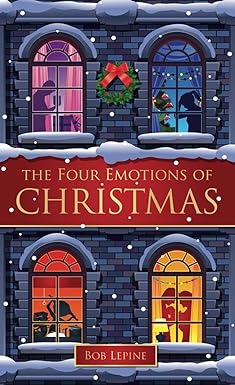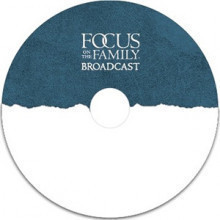Man #1: I always look forward to Christmas because I love finding the right gift for people. But my problem is I hide them too well, and I won’t find the gifts until June or July.
Man #2: I, my family gets together and we just enjoy just a giant breakfast, and it’s just a lot of fun.
Man #3: When I think about Christmas, I think about the joy I get every Christmas day, and when I see my boys running down the steps to go dive into their Christmas gifts.
Woman: It sounds kind of cliche, but Christmas just feels so magical because everybody’s celebrating the same holiday at once, and, uh, we all share that with each other.
John Fuller: Well, I wonder if you can relate to any of those comments. It seems that, uh, we’re in the middle of another busy holiday season. It’s likely that you and your family are experiencing a little bit of stress and excitement at this time of year, or maybe you are feeling a little like the Grinch. Uh, wherever you are on that spectrum of emotions, we have some wonderful encouragement for you today on Focus on the Family with Jim Daly. Thanks for joining us. I’m John Fuller.
Jim Daly: John, I don’t know about you, but I remember Christmas. I mean, we were dirt poor, you know, in that situation what I got for Christmas was pajamas, a belt, socks.
John: Hmm.
Jim: You know, my mom, the, this was an opportunity to give the kids what we needed, right?
John: Yeah. Yes.
Jim: But it was still, it was so much fun. And, you know, I can remember playing Twister. She gave us the game of-
John: Twister (laughs).
Jim: … Twister, and we did that. But I was a pretty joyful little boy, even though I, I probably didn’t realize we didn’t have much.
John: Yeah.
Jim: But it was fun to open up and find a new pair of pajamas or something.
John: Mm-hmm. Yeah.
Jim: That was good. And I’m sure, uh, most people have cherished memories of Christmas. Uh, maybe some good and bad, but just that sense of joy and hope and peace, which is what we all long for, right?
John: Mm-hmm. Yeah. That’s, that’s hallmark-
Jim: Yeah.
John: … those are hallmarks of the Christian.
Jim: Well, it’s also that common grace. There’s something in us, all of us, Christian, non-Christian, that something about the spirit and the season draws us toward that kind of good thing.
John: Yeah.
Jim: And, uh, that’s why I love Christmas so much, the overwhelming sense of what it’s about.
John: Yeah.
Jim: And we’re gonna talk today with a good friend about, um, you know, four emotions of what Christmas brings.
John: Yeah. It seems, Jim, as you’re speaking, that the good news gets crowded out by so much commercialism.
Jim: You think.
John: I mean, the Christmas music started in October, for goodness’ sake.
Jim: Yes.
John: Um, that’s really hard for us to press on through, but as you said, we have a great guest. Bob Lepine is here, and, uh, he’s the teaching pastor at Redeemer Community Church in Little Rock, Arkansas, longtime radio host, and, uh, is an author and speaker and a podcaster as well. And, uh, we’re gonna hear about his book, The Four Emotions of Christmas, which is a terrific little resource, and we have details for you about it at focusonthefamily.com/broadcast.
Jim: Well, Bob, welcome back to Focus.
Bob Lepine: It is always great to be here. Thanks for having me.
Jim: Let me, let me start with this concept, and it’s such a beautiful part of scripture, John 3:16, “For God’s so loved the world that He gave…” That’s the gift.
Bob: Yeah.
Jim: “His only Son, that whoever believes in Him should not perish, but have eternal life.” That’s the gift God has given us.
Bob: Right.
Jim: I mean, that’s awesome, isn’t it, (laughs)?
Bob: It is. And, and in fact, I think we should think about the attributes of God. One of His attributes is He is a giving God.
Jim: Yeah.
Bob: He’s generous. He gives, and we are to be like Him. So we ought to be giving people, we ought to be people who think about generosity and giving during this time of year. And of course, the whole season points us in that direction. That’s a part of what retailers are hoping-
Jim: Yeah (laughs).
Bob: … we will do all of this, this year, uh, that we will be giving people. And I, I saw a statistic that said the average family will spend somewhere around $900 as a family to give gifts to family members and friends. So there’s a lot invested in this season.
Jim: Yeah. There really is. And that’s, you know, that’s part of it, the, the differentiation that we need to do as Christians to say, okay, it’s great to receive a gift. It’s great to give a gift, but that’s really not the purpose of the season. Right?
Bob: No, that’s right.
Jim: It’s to acknowledge God.
Bob: Well, and, and we’re surrounded by messages as, as John as you said, starting in October, we hear on the PA at the shopping center, “It’s the most wonderful time of the year, joy to the world, peace on earth.” And we think that’s what my heart’s longing for. My heart is longing for joy and peace and wonder. And maybe this year I’ll experience that. But what we often find when we get into the season is that instead of joy and peace and love and wonder, we’re getting stress and unmet expectations and sadness. And we go, “How, why did Christmas let me down this year?” I think a lot of people feel that way.
Jim: It’s funny. I was thinking you were gonna say, “Get out of, get out of the way, lady. I gotta get in line.” That’s, uh-
Bob: (laughs).
Jim: “… I’ve got Christmas presents to buy.”
John: Yeah.
Jim: That’s what the, the season brings to me is-
Bob: Right.
Jim: … is how, how can I shorten that checkout?
Bob: Your patience. (laughs)
Jim: Um, you’ve identified these four common emotions. I, I was kind of interested as I read the, the book, uh, and it, it’s a quick read.
Bob: Yeah.
Jim: You’ve done this, so it could be a great gift for Christmas, actually, but three of ’em are, are not positive.
Bob: Right.
Jim: Um, and there is one that is, and we’ll go through them one at a time. We only have to cover four. Good thing you didn’t write the 15 emotions of Christmas.
Bob: (laughs).
Jim: We have three day program.
Bob: A week-long series. Right? (laughs).
Jim: But you start with disappointment. And, you know, again, I mean, I did, I, I did not have a easy childhood, but I’m sitting here thinking, I never, I don’t think I ever felt disappointed, even though my friends got more toys than me.
Bob: Right.
Jim: But what, why do a lot of people feel disappointment at Christmas?
Bob: I think it’s more grownups that feel it than kids-
Jim: Oh, interesting.
Bob: … that feel it. Because I think we come in as grownups with expectations that we have for what this holiday is gonna be.
Jim: Mm-hmm.
Bob: We want it to be special. We want it to be perfect. We want the decorations to be just right. We want the family relationships to all meld together. We come in and, and we have memories of great Christmases in the past, we wanna replicate that. And then something goes wrong in the middle of it. Somebody has to cancel and can’t come. Somebody says the wrong thing at a holiday party. Or you find out that what you wish you could give to the kids this year is just not in the budget. It’s not gonna work. Or they don’t have it anymore at the store. They’ve sold out of all of those things. And our idealized hope for what this holiday can be, we wind up experiencing unmet expectations and disappointment that comes with that. And I think oftentimes we can get to the end of the season and go, “I wanted it to be more than it was, and it just didn’t turn out that way.” And there’s a sadness that comes with that.
Jim: There’s a, you know, I was criticized with my first book, uh, Finding Home, you know, Daly’s most important, uh, lesson here is don’t have high expectations, (laughs). But I’ve really enjoyed my life-
Bob: (laughs).
Jim: … having rather low expectations, especially about the people around me.
Bob: Right.
Jim: Because human beings, we let each other down.
Bob: Yeah.
Jim: I mean, that’s the, the fact of life. And-
Bob: But when you-
Jim: … especially if you have high expectations for relatives performing well at Christmas (laughs).
Bob: And when you’re watching the Hallmark Channel-
Jim: Yes.
Bob: … and you’re seeing the perfect working out of relationships, or you’re seeing other families, you look at the Christmas cards, those pictures we get in the mail-
Jim: (laughs).
Bob: … that we forget, it took somebody-
Jim: For sure.
Bob: … 300 shots to get that one where everybody’s looking at the camera.
Jim: And we may have spent 500 bucks for that photographer.
Bob: That’s right. But, but we look at that and we go, “Their family looks so good, and I know what mine is.” And so there is that, that sense of I’m failing here. And I think a lot of people feel that in a heightened way-
Jim: Yeah.
Bob: … because the Christmas season is supposed to be special and magical. And if that’s what’s not happening at home, I think we feel a letdown from that.
Jim: In that place of disappointment and expectations, you go to a story that we don’t often think about with Mary and Joseph to help us better manage our expectations. What did they teach us and what they said and experienced?
Bob: Well, of course, their expectation had nothing to do with having a baby before they got married.
Jim: Yeah (laughs).
Bob: Right?
Jim: Let’s start there.
Bob: You, you stop and think about what they were expecting. Here was a young Jewish girl who was betrothed to a man, to Joseph. We don’t know what his age was, but we have to imagine there was some expectation, maybe some hope for joy. Mary as a young woman, she was a pious young woman, a devout young woman. Joseph appears to have been a pious young man. So we can think that this 13, 14, 15-year-old young woman was hoping for a beautiful marriage and a, and a loving family. And then she gets a message from an angel who says, “You’re gonna have a baby. And everybody…” He, he doesn’t say this, but the implication is, everybody in town’s gonna be looking and thinking, “Okay, we know what happened here.”
Jim: Yeah.
Bob: And they don’t know what happened here. So the wedding had to be changed. The wedding plans got changed. How they started their, their life together got changed. And in fact, in the middle of it, Rome comes in and says, “I know you had wedding plans. We have a census that trumps your wedding plans. You’re gonna be traveling from Nazareth to Bethlehem by donkey while you’re pregnant.” This was not the way you wanted to start your marriage together. So the expectations that Mary might have had, and I’m using some creative imagination here, but I think it’s realistic for a young girl to have that. All of these, when the angel came and said, “Uh, change of plans. You are with child and you’re gonna give birth to the Messiah.” Here’s the thing we learned from Mary. Her response to that was, “Be it done to me, according to His will.”
Jim: Yeah.
Bob: She, she surrendered immediately to God’s purpose and plan for her life, and found her joy in that rather than in her own expectations of what that holiday… Of course, it wasn’t a holiday back then, they weren’t celebrating Christmas, but what that special time in her life was gonna be.
Jim: And how does that translate to us today at the Christmas season? How do we learn from that and apply it to our own life?
Bob: I think we have to recognize as we go through the season, there are going to be twists and turns and curveballs and things that, th- e- expectations that get unmet, there are gonna be adjustments that you have to make and disappointments and letdowns. And I think we have to go through the season with an attitude, a mindset that says, “You know, God is in control of all the events in my life, and I’m gonna trust Him for the detour that He’s just put me on. And I’m gonna purpose to glorify Him in the midst of this detour, even if it’s not what I was hoping for or longing for.” Uh, the Bible says, when you experience trials, you’re to count it joy. And so joy to the world may mean trials for you this Christmas. And if that’s the case, embrace the trial.
Jim: That’s good.
John: Okay. Now, Bob, um, you and I met in Texas. You were in San Antonio, and I think there’s a story in the book that shares a little bit of a, a detour or an unplanned moment revolving, uh, around queso and, uh-
Bob: Fajitas.
John: … and fajitas. Yeah. Tell us that story.
Bob: Queso and fajitas have been a part of our Christmas tradition ever since we lived in San Antonio. And Christmas was a busy time. And so for Christmas Eve, we didn’t have anything special. I said, “Honey, I’m just gonna stop by the Alamo Cafe. And I’m gonna get a pound of fajitas and refried beans and rice and queso, and that’s what we’ll have for Christmas.” The kids were young enough that we would take a tortilla and put refried beans on it, roll it up. That was dinner for them. Right.
Jim: (laughs). Absolutely.
Bob: So we could stretch a pound of fajitas a long way with our young family, and it became a regular tradition. Every Christmas Eve we had fajitas. Well, when we moved from San Antonio to Arkansas, I went to the store and said, “I need some skirt steak,” which is what you make beef fajitas or skirt steak. And they looked at me and said, “You mean flank steak? ‘No skirt steak fajita meat.'” And they said, “I don’t know what you’re talking about.” This was back in the ’90s and fajitas weren’t the big thing then.
John: Right, right.
Bob: Well, all of a sudden it’s like, are we gonna be able to have Christmas Eve the way we’ve always had it? Are we gonna, when a, when a tradition, a family tradition gets let down, there’s disappointment that can come with that? Now here’s what happened in that, over time, this Christmas fajita dinner… By the way, I was able, I went about six grocery stores, finally at Sam’s Wholesale Club I found some prepackaged fajita meat. We made it work.
Jim: Bingo, (laughs).
Bob: Yes. But over time, as our family expanded and we started to try some new recipes, and we added not just queso, but we should have guacamole and, you know, it was all-
Jim: Yeah.
Bob: … coming into this, well, this simple Christmas Eve meal became an elaborate thing that started to really stress out my wife. I don’t know about how it is at your home.
Jim: Yeah. I’ve never been there before (laughs).
Bob: Meal planning for the holidays-
John: Uh-huh.
Bob: … can be a major stressor-
John: Yeah.
Bob: … for my wife. Christmas Eve, Christmas breakfast, Christmas dinner. That 24 hour period does not bring joy to the world, or peace on earth and goodwill to men.
John: Right (laughs).
Jim: Especially bouncing off Thanksgiving.
John: Yeah (laughs).
Bob: That’s right.
Jim: That was only a month ago.
Bob: That’s right. So, so we had to learn again in the midst of this, that, that, uh, the holiday can bring stress. And you have to depressurize that’s, I, that this is one of the emotions of Christmas that I think we have to anticipate and make adjustments for. And if that means that you have to ratchet down the fajita dinner on Christmas Eve, this is what I’ve learned, you might have to say, “Okay, I’ll just stop by the Mexican restaurant and get it. We don’t have to do the fancy one anymore.”
Jim: (laughs). Yeah.
John: Yeah. Yeah. Well, this is Focus on the Family with Jim Daly. We’re talking today with Bob Lepine about The Four Emotions of Christmas, a terrific little book he’s written. And, uh, we’re gonna encourage you to get a copy or two or three or 10. And, uh, we’ve got details for you at focusonthefamily.com/broadcast, or call 1-800, the letter A, and the word FAMILY.
Jim: Bob, in the book, uh, The Four Emotions of Christmas, you talk about the use of holiday and what it actually means. That has been, it almost feels now in the Christian community that we don’t want to use the word holiday-
Bob: Right.
Jim: … ’cause it’s too general and it’s become kind of a trigger word. You need to say Christmas-
Bob: Right.
Jim: … if you’re a believer. But holiday in the book, you point out, used to be called Holy Day.
Bob: Yes.
Jim: And now it’s been kind of co-opted by that. But speak to the origin of Holy Day.
Bob: Yeah. That, that’s the derivation of the word. This, the Christmas holiday, interestingly enough, has an, uh, a long history. So there was no Christmas for the first 300 years of the church. It wasn’t until, uh, Constantine became the emperor that he declared a feast around the, the Saturnalia Feast. He said, “We’re gonna have a Feast of the Nativity.” That’s when Christmas was kind of, uh, established.
Jim: Born. And Easter was really, the early churches-
Bob: Was there, there’s Central-
Jim: … holiday.
Bob: … holiday, right?
Jim: Right.
Bob: And then there was a long period through the Dark Ages where Christmas kind of fell along the wayside. Some of the Puritans thought it was a Pagan thing to celebrate Christmas. Christmas was banned in Boston for a 20-year period back in the 1600s.
Jim: Hmm. You sure it wasn’t 200 years (laughs), I feel that way.
Bob: But, but this was, this was the history of Christmas. It wasn’t until Dickens wrote a Christmas Carol and until Macy’s decided to have a holiday parade, that all of a sudden we started to say, “Oh, maybe we should pay a little more attention to Christmas.” But in the process of it becoming a celebration, a secular celebration, we lost the idea that the focus of this day, it’s a Holy Day. We are to commemorate the birth of Jesus on this day. And it’s not wrong to have festive meals. It’s not wrong to open presents or give gifts, but I think it is wrong to let this day pass without stopping and pausing and remembering the great gift that we were given at Christmas. We were given the gift of salvation in the person of Christ at Christmas. And that’s what this Holy Day is all about. And so, while you’re enjoying the fun and the family and the laughter, we need to make sure that leading up to and on that day, we are keeping Christ at the center of our celebration. And remembering that’s what this is really all about.
Jim: I like, I think I’m gonna re-Institute that at our house, you know, call it the Holy Day, the holidays.
Bob: Yeah, I think that- yeah.
Jim: I like that theme. And that does focus it a bit better. The third emotion is sad, sadness. And you know, here at Focus, we have, uh, counselors that are answering calls and, you know, people that are having and experiencing some difficulty in those emotional areas to, to call us. And I’d encourage people to do that.
Bob: Mm-hmm.
Jim: I mean, they’re here for you. And we will, if you can, if they can’t talk to you right away, they’ll schedule a time to get back to you-
Bob: Mm-hmm.
Jim: … ’cause we don’t want you to be sad and lonely and depressed during Christmas. That’s not, that’s not what the season’s about.
Bob: Right.
Jim: But we know those emotions are real and people, you know, it’s, it’s family breakdown, the things I didn’t have when I was a child, all those things. But we wanna encourage you to reach out to a friend, your church, a pastor, et cetera, Focus, whatever it might be. But you talk about depression, sadness being a common struggle at Christmastime, and you have a story about the worst Christmas ever-
Bob: Yeah.
Jim: … in the book. I’m so glad you’re the author of this book-
Bob: (laughs).
Jim: … so I don’t have to put my worst Christmas ever in there (laughs). But what was your worst Christmas?
Bob: Our family had moved to California away from extended family. This was going to be the first time that in our married lives, it was going to be just us. Nobody coming to visit. We weren’t going to visit anybody. And on this first Christmas, we had lived in Sacramento for two months. We didn’t know a whole lot of people. We hadn’t decided what church we were gonna land in yet. And so on this Christmas morning, it was Maryanne and me, our three and a half year old daughter Amy, and Maryanne was four days away from giving birth to our second child.
Jim: A little busy.
Bob: Yes. And we woke up on Christmas morning and went down and under the tree were presents for Amy. The, the whole thing, Jim, took about 20 minutes.
Jim: Mm-hmm.
Bob: And it was fun, and then it was over.
Jim: Hmm.
Bob: And it was 7:30 and we had a special breakfast. And then we looked around and go, “What do we do? We don’t know anybody.”
Jim: Hmm.
Bob: And we kept waiting for phone calls from family members throughout the day to call and say, “Merry Christmas, how are you doing?”
Jim: Wow.
Bob: And nobody was calling. And it was a lonely long day. In fact, we hadn’t planned on any Christmas dinner. And I looked around and said, “Well, okay, there’s gotta be a restaurant open we can go to on Christmas Day.” Well, we found one, it was kind of a sad cafeteria that not a lot of people were at. And again, it was a depressing Christmas dinner with the three of us going, this is the worst Christmas ever.
Jim: Mm-hmm.
Bob: Finally, it was five o’clock in the afternoon. We hadn’t heard from Maryanne’s mom. We thought, “Well, we’ll call her.” It’s seven o’clock back Central Time. So we call and she answers the phone. She says, “Oh, hi. Merry Christmas. Everybody’s over here. We’re having a party. I really can’t talk right now, but Merry Christmas.”
Jim: Oh, wow. Icing on the cake.
Bob: Yes.
Jim: (laughs).
Bob: So we looked back on that and said, “Okay, we can’t have another Christmas like this. We gotta make sure that we anticipate this.” But it was sad, it was lonely because we were unplugged from relationships-
Jim: Yeah.
Bob: … and because it was just us. And, and relationships matter so much at Christmas.
Jim: You know, some people are gonna experience that, Bob.
Bob: I know.
Jim: So if you could relive that day, what would you do differently?
Bob: I, I would be intentional about, uh, anticipating how we could be together with other people who might be in our situation.
Jim: Mm-hmm.
Bob: Maybe people in the church we go to and our, in the church where I pastor now, we look around and say, “Okay, who might be alone on Christmas day?”
Jim: Oh, that’s good.
Bob: “And let’s make sure that they’re cared for.” You make sure that the widows have a place to go. That family is gonna come in. I, I think we have to anticipate what that day is gonna be. And if you look at that and go, “Okay, there’s nobody to, to meet with. I can’t find anything.” Then I would find out who’s serving Christmas dinner at the homeless shelter and volunteer-
Jim: Yeah.
Bob: … and go down there.
Jim: That’ll raise your spirits.
Bob: Yeah. Look for a way-
Jim: Yeah.
Bob: … you can get in and serve and be with people and, and find some joy in that day ’cause there are ways to do it if you’re intentional. You know what, if it’s Christmas day and, and you’ve got no place to go, you can, you can make some Christmas muffins and go up to the hospital where there are people working and go to the-
Jim: Yeah. Yeah.
Bob: … nurse’s station and say, “I just wanted to bring you some Christmas cheer-”
John: Mm-hmm.
Bob: “… ’cause I know this is a hard time for you.” Or the fire station or the police station. There are places where there are people working at… Go to the convenience store and say, “Merry Christmas. I just wanted to bless you.” Find a way to, instead of just getting wrapped up in yourself, how can you be a blessing to others on that day?
John: That’s great.
Jim: That’s a good idea.
John: Yeah. That others centered, uh, perspective that’s kind of captured in Isaiah. We hear a lot from Isaiah at Christmastime. Uh, you cite in the book from Isaiah 9, how we can be light because Jesus entered the world as light.
Bob: Yeah.
John: T- talk about that.
Bob: Isaiah 9 starts off with this idea of the people who walked in darkness have seen a great light, and those who lived in a land of deep darkness, the light has come. And when we feel like we’re in a dark world, Jesus is the light of the world. And, and I think to get out of ourselves and our own situation, our own circumstance, and ask ourselves, how can we be other centered? How can we be God centered in our thinking in this? I think that can start to bring light into the darkness. You can be a light as a follower of Christ, you are the light of the world. And so you have the opportunity to go out and let that light shine and find ways you can serve people if you’re alone on Christmas day.
Jim: Bob, we finally have arrived at the fourth emotion that you highlight my favorite, joy. We finally got you a good one after covering, let’s see, disappointment, stress, and sadness, joy.
Bob: Yeah.
Jim: So let’s go there (laughs).
Bob: And this is the one we’re all hoping for. This is the one we’re all longing for.
Jim: Exactly. And in fact, in the book, you, you get into the definition of merry as in Merry Christmas and how, how the culture has lost the understanding of that word.
Bob: Yeah.
Jim: We say it, but do we know what it means?
Bob: Yeah. The, the Christmas hymn God Rest Ye Merry Gentlemen.
Jim: Yes.
Bob: There’s, there’s a comma in that. And most people think it’s God Rest Ye, comma, Merry Gentlemen. But it’s actually after the merry that it belongs.
Jim: Mm-hmm.
Bob: God Rest Ye Merry. So the idea of resting merry means resting with contentment, with joy in our heart.
Jim: Mm-hmm.
Bob: It means resting in something that is settled, we’re to rest merry in Christ. And, and here’s the thing. Most of us are looking for, uh, the Christmas holiday, the traditions, the gathering with family, the food, the fun, the festivities to produce the joy that we’re longing for. And it can produce momentary happiness. But there’s a difference between happiness and joy.
Jim: Mm-hmm.
Bob: Joy is a settled peace. It’s a settled contentment that knows in the midst of everything, there is still, uh, something that I can hang onto.
Jim: Mm-hmm.
Bob: And so when we think about joy at Christmas, uh, yes, it may come through the events that we experience, but real joy comes only when we understand what Christmas is all about. And the God who made us and the God who’s responsible for Christmas.
Jim: I like that. I think of joy as kind of that rock hard foundation. You know, it’s not gonna be moved by your circumstances.
Bob: That’s right.
Jim: That’s joy. You also point, uh, people to, uh, Luke, you know, the famous Christmas passage in Luke 2, but one part of it that we don’t often quote is Simeon.
Bob: Yes.
John: Mm-hmm.
Jim: Which actually, when you look at evidence for who Jesus was, this is one of the strongest quotes from the Bible, from Simeon.
Bob: I love this story-
Jim: Describe it.
Bob: … of the old man in the temple. He had been coming to the temple for decades because God had given him a promise, “You will not die until you see the Messiah.”
Jim: Think of that.
Bob: So every day, Simeon goes thinking, “Is today the day is to…” and now he’s old. We’re not sure how old, but near death. And he shows up one day and here come Mary and Joseph into the temple with their baby. And the Holy Spirit quickens in him, “That’s him. That’s the Messiah.” So he goes up to them and he says, “May I, may I bless your baby, may I hold your baby?” They don’t know what’s going on. And the old man takes the baby and he says, about the baby, “Lord, now I can die in peace.” He says, “Because I have seen the salvation, a light to the Gentiles and the glory of your people, Israel.” And so the, the longing of his own heart was fulfilled in that moment when he had a chance to see Jesus. And I think about people today who have celebrated many Christmases but have never seen in Jesus that he is a light to the Gentiles and the glory of Israel. They’ve never seen that this is God’s salvation to us. And my prayer, when I wrote this book, I thought, would the people would give this book to their neighbors, their friends, to, to people in their neighborhood, take a plate of cookies, an invitation to your Christmas Eve service at church, and a copy of the book and say, “Merry Christmas.” And give it to people who don’t go to church. And maybe in reading about this, something will stir in their, their own heart, their own longing for joy. And they will say, “Maybe the issue in my life is a spiritual issue. Maybe I need to, to surrender my life to the Lord.” That’s my hope for this book.
Jim: Yeah. And I love that. And going back to, to this idea that at this season, don’t look for the temporal emotional fix.
Bob: Right.
Jim: You know, these are the long term things that we’re talking about. A sense of joy, deep peace, uh, that you have in a relationship with Christ.
Bob: It doesn’t hurt to put an occasional Band-Aid on a, on a wound.
Jim: Yeah.
Bob: But if we want to heal the wound, it takes more than a Band-Aid. So yeah, there can be some quick fixes, some adjustments along the way, but ultimately let’s address these, these emotions spiritually by saying, God is the source of joy and peace and hope in my life.
Jim: Well, you said it Bob, and this has been wonderful, a great reminder about what the Christmas season, the Holy Days are actually about. Uh, The Four Emotions of Christmas, again, it’s a great little gift to give people. Buy a dozen (laughs), you know, and give them out-
Bob: Mm-hmm.
Jim: … to whomever, uh, might need that encouragement. Uh, again, Four Emotions of Christmas. And you can get that directly from Focus on the Family. And when you do, uh, all the proceeds go right back into helping families not paying shareholders. And if you can make a gift of any amount, we’ll send you a copy as our way of saying thank you for being part of the ministry.
John: Yeah. Donate today when you call 800, the letter A, and the word FAMILY. 800-232-6459. Or stop by focusonthefamily.com/broadcast for all the details.
Jim: And, uh, as we often do at the end of the year, John, we have also some friends that have put up a matching, a healthy matching gift. So when people make that gift of 25 or $50, they’re gonna match it-
John: Mm-hmm.
Jim: … another $25 or $50, so we can reach twice as many families. It’s just a fun way to spur on giving during the Christmas season.
John: Indeed, it is. Uh, contact us today. Donate generously as you can. Uh, your gift will be doubled today when you call 800, the letter A, and the word FAMILY. Or you click the links at focusonthefamily.com/broadcast. Well join us next time as Rosaria Butterfield shares her incredible story of going from lesbian activists to ambassador for Christ.
Dr. Rosaria Champagne Butterfield: It’s not faithful and it’s not compassionate if you don’t help people know that God saves sinners just like me, and He changes our lives. He liberates the captives. That’s the gospel.




















